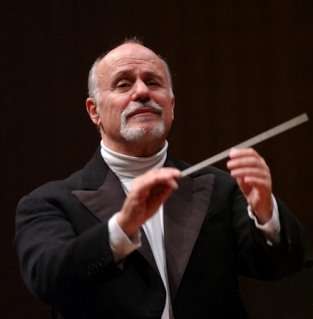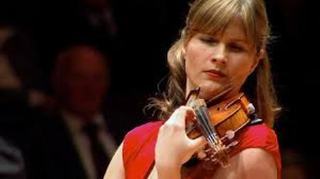|
Back
The Century of Passion New York
Avery Fisher Hall, Lincoln Center
02/05/2015 - & February 6, 7, 2015
Christopher Rouse: Iscariot
Samuel Barber: Concerto for Violin and Orchestra, Opus 14
Sergei Rachmaninoff: Symphony No. 2 in E Minor, Opus 27
Lisa Batiashvili (Violin)
New York Philharmonic Orchestra, David Zinman (Conductor)

D. Zinman (© Courtesy of the Artist)
The Philharmonic’s three choices this week formed an arch around the 20th Century: the start (1908’s Rachmaninoff Symphony), the middle (Samuel Barber’s 1949 Concerto) and the near-finish (Christopher Rouse’s 1989 quasi-tone-poem Iscariot). And while probably coincidental, all three works were filled with such passion, that they could have been interchangeable.
With David Zinman at the helm, one had no fear that any of the music would be exaggerated or even idiosyncratic. His long-time experience throughout Europe, before this New York-born conductor was “discovered” in his own country, means that his prudence and excellent good sense almost always makes for a comfortable evening. But with three works of such overpowering emotion, that “good sense” allowed the music to sing by itself. The Philharmonic has the right players, so extra nudging would only destroy the effect.
Last night was a very special one for Christopher Rouse, for after several years as a prodigious composer-in-residence, he is leaving. And if his very early Iscariot was his farewell to that post it was hardly a hail for that farewell. But it was an certainly intense.
Mr. Rouse’s trademark (with many exceptions) is loud volume, and he can never resist adding more and more instruments to his inspiration. In the case of Iscariot, the only sign of a fortefortefortissimo sound came with the very first jolting bang of a drum. After that, while Iscariot never whispers, the volume is controlled in a very structured way.
In fact, this is a rather simple work. Strings sing out their own anthems, followed by winds and percussion, followed by strings etc. etc. With the exception of a long percussion cadenza in the middle, this is simply a matter of strophes and antistrophes, along with a few quotes from Bach, a horn solo and a very very slow tempo. Such a tempo is certainly appropriate for the Judas Iscariot figure. Although Mr. Rouse didn’t tell a linear story here, Iscariot’s act of causing the death of God does not call for a hornpipe and jig.
The result was an intensity, a ready-made architecture, and modal, almost Medieval chords.

L. Batiashvili (© DigitalConcertHall)
That same intensity was manifest in Samuel Barber’s Violin Concerto, and I can think of nobody–not even Hilary Hahn, who made a splendid recording of the work–who can play it like the Georgian-born Lisa Batiashvili. The piece is so consciously beautiful in the first two movements, that it takes a special violinist who doesn’t sink into that most lush landscape of sounds.
Ms. Batiashvili’s Guarneri del Gesù violin was probably a better choice than a Strad, since the light bright Strad sounds would over-underline Mr. Barber’s super-romantic aspects. Instead, we had Ms. Batiashvili’s lean introduction, followed by an Andante of the most lovely silken threads. Mr. Barber’s final perpetuum mobile is short, difficult and of no particular challenge to the violinist last night. As one of the Phil’s artists-in-residence, Ms. Batiashvili calls the Barber “the American concerto”, but she will be performing far more this year, including a world premiere.
The last half had the earliest–and by far the longest–Twentieth Century work, Rachmaninoff’s hour-long Second Symphony. Mr. Zinman was already in the emotional mood, but all he needed here was to follow the Russian composer’s notes, which piled over and over each other with some dazzling climaxes. All the instruments were on target for Mr. Zinman, but one had to single out Anthony McGill’s clarinet solo in the slow movement, and Concertmaster Sheryl Staples in her solos throughout.
Frankly, I’m certain that this program was not chosen for next week’s Valentine’s Day, but the results were demonstrably of passion, emotion and palpitating emotion.
Harry Rolnick
|